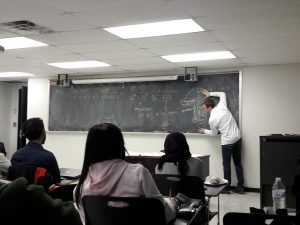Date: March 29, 2018Speaker: Dr. Viviana Acquaviva (NYCCT)Title: The science of machine learningAbstract: Machine learning is the discipline of teaching computers to recognize, classify and predict relationships within data. It has countless applications in the most diverse fields: it can be used to generate to recommend movies and articles, to generate poems in the style of Shakespeare, to accelerate diagnoses of dangerous diseases, to prevent insurance fraud, to improve system security, and many other endeavors. At their core though, machine learning algorithms are just a set of clever mathematical tools that allow us to re-map complicated questions onto simpler optimization problems. We discuss our ID course, Machine Learning for Physics and Astronomy, in which we use data sets from Physics and Astronomy and Python programming to learn machine learning from the ground up. We present a selection of algorithms to solve challenges such as discovering new elementary particles, finding dark energy, identifying variable stars, and understanding the origin of galaxy shapes.
Monthly Archives: March 2018
“Roulette Wheel Betting” by Johann Thiel
Date: March 22, 2018
Speaker: Johann Thiel
Title: Roulette Wheel Betting
Abstract: A typical American roulette wheel has 38 different pockets. Two are colored green while the other 36 are split evenly between black and red. One way to bet on the roulette wheel is to bet on the color (black or red) of the next spin. The payout for this kind of bet is 1-to-1.
If we start out with $30 and want to try to double our money (or lose it all trying), what betting strategies can help improve our odds? What does this have to do with matrices? We will try to answer these questions and more in this introductory talk.
“Numbers: Real vs Imaginary” by Arthur Kramer
Date: March 15, 2018
Speaker: Arthur Kramer
Title: Numbers: Real vs Imaginary
Abstract: Imaginary numbers are as “real” as real numbers. Many of the greatest minds did not fully accept imaginary numbers as “real” mathematical quantities. It took a brilliant engineer to see in them as an elegant application to solving the problems of ac electricity. Such is the story with many scientific discoveries. Prof. Kramer will explore numbers and the evolution of imaginary numbers, the intriguing history surrounding them and their eventual acceptance as a “real” number system by the scientific community.
“Is the product of any k many consecutive integers always divisible by k factorial?” by Thomas Johnstone
Date: March 8, 2018Speaker: Dr. Thomas Johnstone (NYCCT)Title: Is the product of any k many consecutive integers always divisible by k factorial?Abstract: Recall that “k factorial” is defined as the product of all integers between 1 and k, inclusive. There are many examples when the product of k many consecutive integers is divisible by k factorial. For instance, if k=5, then the product of the five consecutive integers 12, 13, 14, 15, 16 is divisible by five factorial: indeed, 12*13*14*15*16=524160, which is divisible by 1*2*3*4*5=120.In this talk, we will answer the question whether the product of k many consecutive integers is always divisible by k factorial. While this question can be answered using combinatorial arguments, we shall rely on elementary number-theoretic arguments such as basic divisibility rules only.




